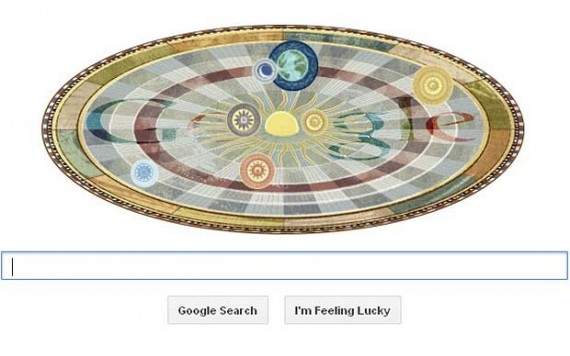 Sunday past was the 413th anniversary of the execution of Giordano Bruno (burned at the stake for heresies such as proposing that the Sun is a star and that the other stars in the sky are also Suns, probably accompanied by planets very much like ours). Today, more auspiciously, is the 460th anniversary of the birth of Nicolaus Copernicus. He managed to postulate that the solar system revolved around the Sun, rather than the Earth, while remaining a Chapter Canon of Frombork Cathedral and important local civil servant during the early decades of the Reformation. Gallileo was put under house arrest for saying much the same things less than a century later and 1500km or so to the south. Times change.
Sunday past was the 413th anniversary of the execution of Giordano Bruno (burned at the stake for heresies such as proposing that the Sun is a star and that the other stars in the sky are also Suns, probably accompanied by planets very much like ours). Today, more auspiciously, is the 460th anniversary of the birth of Nicolaus Copernicus. He managed to postulate that the solar system revolved around the Sun, rather than the Earth, while remaining a Chapter Canon of Frombork Cathedral and important local civil servant during the early decades of the Reformation. Gallileo was put under house arrest for saying much the same things less than a century later and 1500km or so to the south. Times change.
It took time for the Reformation to settle into the political and military battle it later became. The Peasants’ War in 1524 encouraged both Catholic and Protestant rulers in German-speaking Central Europe to play a cautious hand and, in almost all cases, co-operate to serve their common interests. The England of Henry, Mary and Elizabeth, however, with its fanaticism of both Puritan and Ultramontane varieties, murderous dissolution of the monasteries, Secret Police and bloody executions of religious dissidents was an unusual epicentre of violent fanaticism in the Reformation’s early decades. But then England had always tended to be a little bit fanatical when it came to religion. Here, alone in the Catholic world, the laity were banned from reading the Bible in the vernacular before the Reformation, the electrifying effect of Wycliffe’s late 14th Century translation terrifying the authorities. The continent-spanning cult of martyr-pilgrimage surrounding Thomas a Becket at Canterbury Cathedral also marks England out as an unusually devout country with a history of religious intolerance and brutality by the state. English latitudinarianism and later secularism needed to have Puritanism test itself to destruction during Cromwell’s Commonwealth before it found fertile territory.
The Polish-Lithuanian union in which Copernicus lived, however, was a bastion of religious tolerance and free thought in its 16th century heyday. Catholics, Orthodox, Lutherans, Reformed Protestants and Unitarians all worshiped and argued freely, as did Jews and even the small communities of Muslim Lipka Tartars* who had settled around the time Wycliffe was translating the Bible into English. In the ‘state without stakes’, Lutheranism understandably proved particularly popular among ethnic Germans, but also attracted Slav adherents. Reformed Protestantism of the Calvinist/Zwinglian flavour proved more successful among the Polish and Lithuanian nobility and educated urban classes – but not universally so. Copernicus’ Warmia was one of the regions which remained largely loyal to Rome.
In this battleground of ideas, the Jesuits produced some of their finest scholarship and best educational institutions. These, combined, with the Protestants’ limited attention to evangelism among the rural poor began to turn the tide back towards Catholicism; the Dominicans, long established in Poland and never fans of the Society of Jesus, worked tirelessly among the peasantry, as they did in Ireland. Then the Union of Brest, which saw Ruthenian Orthodoxy break with Constantinople and pledge allegiance to the Pope while retaining its liturgy and married clergy (and, yes, the modern parallel is obvious), fatally damaged Orthodoxy in Central Europe while shifting the balance of power in Poland-Lithuania decisively towards Latin Catholicism.
As the decades passed, the Reformation’s cold wars were getting ever hotter, and boundaries between explicitly confessional states across Europe ever more firmly fixed. The mid 17th Century produced a devastating Swedish invasion of Poland, which permanently weakened the Commonwealth and did much to damage the cause of Protestantism in Poland-Lithuania. The adherents of the indigenous Unitarian church called the ‘Polish Brethren’ were expelled soon after the Swedes withdrew, tarred as collaborators with the Protestant invaders. The Khmelnytsky Uprising of the same period saw Poland’s eastern boundary fixed more-or-less along the ever more firmly defined confessional boundary between areas of predominantly Uniate adherence, loyal to Rome, and those which remained loyal to the Patriarch in Kiev, and through him to Moscow. Poland’s late 18th Century partitions only heightened the sense of being a vulnerable Catholic nation trapped between Protestant Prussia and Orthodox Russia. The 20th Century, understandably, did little to change that perception. The great decline in Catholicism in Western Europe since the 1950s has spread eastwards, but Poland has remained much less touched than its neighbour to the south, the Czech Republic or the third representative of culturally-Western-geographically-Eastern Europe, Hungary.
In Northern Ireland, we tend to assume that our society is still shaped more by the Reformation than any other in contemporary Europe. Viewing that great continent-wide contest from its opposite end perhaps challenges that assumption.
* The Lipka Tartars were no less likely than other Poles to emigrate to the United States in around the turn of the 19th/20th Centuries, and opened Brooklyn’s first mosque. Actor Charles Bronson is of partial Lipka Tartar ancestry.
Follow me at twitter.com/gerrylynch and facebook.com/gi0rtn and catch up with all my blog posts at sammymorse.livejournal.com
Discover more from Slugger O'Toole
Subscribe to get the latest posts to your email.
